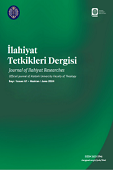Haset ve Gıpta Duygusunun Dindarlık ve Psikolojik İyi Oluş ile İlişkisi Üzerine Nicel Bir Araştırma
A Quantitative Research on the Relationship of Malicious and Benign Envy with Religiosity and Psychological WellBeing
Author(s): Esra İrk, İbrahim GürsesSubject(s): Psychology, Sociology of Religion, Psychology of Religion
Published by: Atatürk Üniversitesi İlahiyat Fakültesi
Keywords: Psychology of Religion; Religiosity; Malicious Envy; Benign Envy; Psychological Well-Being;
Summary/Abstract: Malicious and benign envy, explored from different perspectives in various disciplines, can have either constructive or destructive impacts on an individual's life, depending on their intensity. Malicious envy leading to tensions and conflicts in several domains, whereas benign envy allows for strong and deep motivations. In this context, both malicious and benign envy function as integral parts of the dynamics of transformation or disintegration. The aim of this study is to find out if there is a meaningful relationship between religiosity, psychological well-being, and malicious and benign envy, and to determine the direction and degree of the relationship if it exists. In accordance with this purpose, BeMaS-T Benign and Malicious Envy Scale, Religiosity Scale, and the Psychological Well-Being Scale are applied to a study group comprising 335 females and 179 males, aged between 18 and 65, living in Bursa. Data are collected using Google Forms and analyzed using the SPSS 25.0 program. The results have revealed that there is a meaningful negative correlation between religiosity and psychological well-being with malicious envy. However, no meaningful correlation between religiosity and psychological well-being with benign envy has been confirmed.
Journal: İlahiyat Tetkikleri Dergisi
- Issue Year: 2024
- Issue No: 61
- Page Range: 106-121
- Page Count: 16
- Language: Turkish

